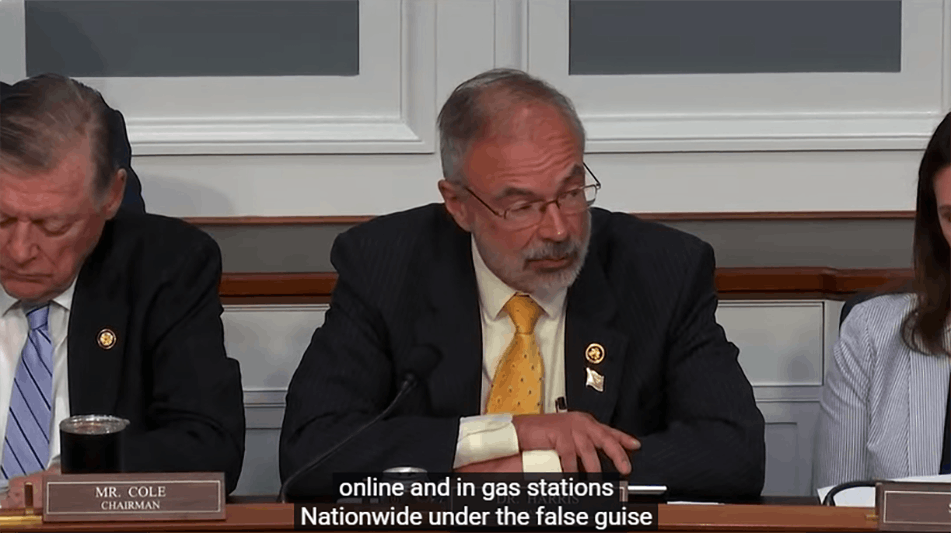U.S. House lawmakers are taking up a must-pass appropriations bill that proposes rewriting the rules on hemp so that the legality of intoxicating products such as delta-8 THC edibles is no longer debatable.
The House Appropriations Committee released the fiscal year 2026 “Agriculture, Rural Development, Food and Drug Administration, and Related Agencies Appropriations Bill” on June 4. The 138-page legislation covers a variety of issues facing U.S. farmers, ranchers, and rural communities, and intends to provide more than $25 billion in discretionary allocations to help protect America’s food and drug supply.
This legislation is passed every year to fund farm programs.
However, the 2026 proposal, as introduced, would redefine hemp to exclude any hemp-derived cannabinoid products (finished goods) containing:
cannabinoids that are not capable of being naturally produced;cannabinoids that are capable of being naturally produced but were synthesized or manufactured outside of the plant; orquantifiable amounts of THC or THCA, or other cannabinoids that have similar effects on humans or animals.
The legislation authorizes the U.S. Secretary of Health and Human Services to determine what qualifies as “quantifiable amounts” of THC or other cannabinoids.
Meanwhile, industrial hemp grown for fiber, grain or other non-cannabinoid purposes would be defined separately.
In other words, the legislation would backtrack on defining hemp as containing no more than 0.3% delta-9 THC on a dry-weight basis during a pre-harvest field test, as provided under the 2018 Farm Bill, which federally legalized hemp.
Since the 2018 Farm Bill, the intoxicating hemp product marketplace has exploded to a multibillion-dollar industry, especially in states absent of cannabis legalization, such as Texas, where cannabinoids from legal hemp plants are extracted and manufactured into consumables sold at vape shops, convenience stores and gas stations that are often unregulated.
U.S. House Appropriations Committee Chairman Tom Cole, R-Okla., released a four-page summary of the 2026 spending bill on June 4, writing that it puts the “health, safety, and prosperity of American producers and consumers first.”
Among the key takeaways in the summary, the authors wrote that the bill “supports the Trump administration and mandates of the American people by … closing the hemp loophole that has resulted in the proliferation of unregulated intoxicating hemp products, including delta-8 and hemp flower, being sold online and in gas stations across the country.”
Separately, Cole said that Rep. Andy Harris, R-Md., who has a history of anti-cannabis policy stances, “stewarded” the legislation.
Harris is known among industry stakeholders in Washington, D.C., for spearheading a federal rider that has prevented the city from taxing and regulating adult-use cannabis sales for the past decade, despite district voters backing a 2014 legalization measure with a 70% majority.
Harris chairs the House Subcommittee on Agriculture, Rural Development, Food and Drug Administration, which marked up the 2026 spending bill on June 5 and reported it favorably to the full committee.
“This bill also closes the hemp loophole from the 2018 Farm Bill that has resulted in the proliferation of intoxicating cannabinoid products, including delta-8 and hemp flower being sold online and in gas stations nationwide under the false guise of being ‘USDA approved,’” Harris said during Thursday’s markup hearing. “As many states have stepped in to curb these dangerous products from reaching consumers, particularly children, it’s time for Congress to act to close this loophole while protecting the legitimate industrial hemp industry.”
Last Congress, the House Agriculture Committee approved an amendment offered by Rep. Mary Miller, R-Ill., that included similar language to redefine hemp in what would have had a devastating impact on the cannabinoid hemp industry. That amendment was added to the House’s version of the 2024 Farm Bill reauthorization bill that never found the finish line—the reauthorization, which was supposed to unfold in 2023, was delayed another year.
In part, Miller’s amendment would have redefined hemp to include total THC (including THCA) in the Farm Bill’s calculation of 0.3% on a dry-weight basis.
RELATED: THCA in the Farm Bill: Amendment Goes Far Beyond Closing ‘Loopholes’
The U.S. Hemp Roundtable (USHR), an organization that advocates on behalf of businesses, called the fiscal year 2026 spending bill another blatant attack on the legal hemp industry.
“Rep. Andy Harris is at it again, reviving his crusade to dismantle the hemp industry by quietly inserting harmful language into a federal spending bill,” the organization wrote in a June 4 statement, calling on its members and supporters to contact their representatives to oppose the provisions.
“Buried on page 113 … is a provision that redefines hemp in a way that could ban the vast majority of safe, legal hemp-derived products sold nationwide—any product with any ‘quantifiable’ level of THC,” according to the USHR.
Harris also included the Miller amendment language in the text of his subcommittee’s fiscal year 2025 agriculture/FDA appropriations bill, but that inclusion was ultimately defeated.
Rep. Andy Harris chairs a subcommittee taking up an agriculture-related spending bill that would redefine hemp to prohibit intoxicating products. Read More


